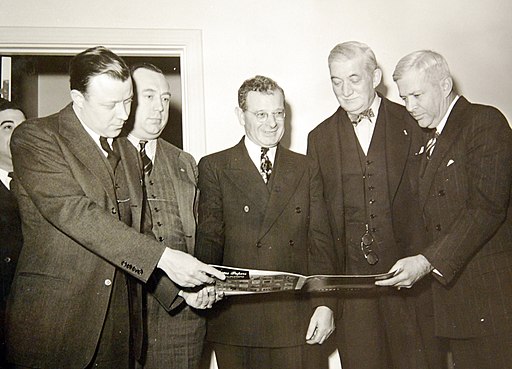
Jacobin‘s Seth Ackerman tells us that “Higher Inflation Doesn’t Reduce Real Wages” (February 22) since it “can only be sustained over time if the demand for labor is strong enough, relative to the supply, to force employers to continually bid up wages.” In those cases, “wages tend to rise faster than profits,” so their purchasing power more than compensates for higher prices.
The socialist magazine editor views worries about inflation as stoked by “central bankers, financial journalists, Wall Street analysts, and the like” to provide cover for the Federal Reserve to enrich them under the pretext of fighting it. Yet the assumption that inflation is driven primarily by labor bargaining power has been eagerly encouraged by Ackerman’s capitalist enemies.
“Why Play Leap Frog?” asked the title of one of a series of animated shorts made for corporate America by John Sutherland Productions in the late 1940s and early 1950s to mollify postwar workers into compliance with management. Only a smooth “production of more and better goods at lower costs” would garner “a real raise” rather than one eaten up by a commensurate bump in prices. The role of bosses and bankers is downplayed in the propaganda they paid for.
Even more ironically, free-market libertarians have exposed the role of inflationary policies in benefiting capitalist elites who are willing to agree with socialists on its causes. At the height of Richard Nixon’s “timid and fitful battle against inflation,” the November 1, 1970 issue of Libertarian Forum noted that “Austrian [economic] theory shows that in the later stages of a boom wages tend to catch up with prices, squeezing profits, and it is then that businessmen are tempted to turn to the totalitarian (and ineffective) coercion of price-wage controls” (Jacobin dubs them “revenue caps”).
In the Winter 1993-94 issue of Free Nation Foundation’s Formulations, Roderick T. Long noted that “an increase in the money supply results in an increase in prices and wages — but not immediately. There’s some lag time as the effects of the expansion radiate outward through the economy. The rich — i.e., banks, and those to whom banks lend — get the new money first, before prices have risen.” This distortion also inevitably causes malinvestment, and “the unemployment caused by this misdirection hurts the poor most of all.”
Thus, inflation need not reach Weimar Republic levels to cause harm far beyond its apparent effects. Ralph Borsodi observed that “it is a lie to say that a little inflation, say two or three per cent, is not stealing but that a lot of inflation, say ten or twenty or thirty percent, is all wrong” since “it is a lie to say you are against stealing, when you are in fact saying that a little stealing is all right.” Instead of prescribing one enlightened policy for the Federal Reserve to manage the economy, Borsodi wanted the Fed to allow competition from private alternatives like his Constant currency.
A free market for labor backed by reliable money would be a real leap forward past inflated political profiteering.
New Yorker Joel Schlosberg is a senior news analyst at The William Lloyd Garrison Center for Libertarian Advocacy Journalism.
PUBLICATION/CITATION HISTORY
- “Inflation Whips Labor” by Joel Schlosberg, OpEdNews, March 3, 2022
- “Inflation Whips Labor” by Joel Schlosberg, Ventura County, California Citizens Journal, March 4, 2022
- “Inflation Whips Labor” by Joel Schlosberg, Miles City, Montana Star, March 4, 2022
- “Inflation whips labor” by Joel Schlosberg, Lake Havasu City, Arizona News, March 5, 2022


